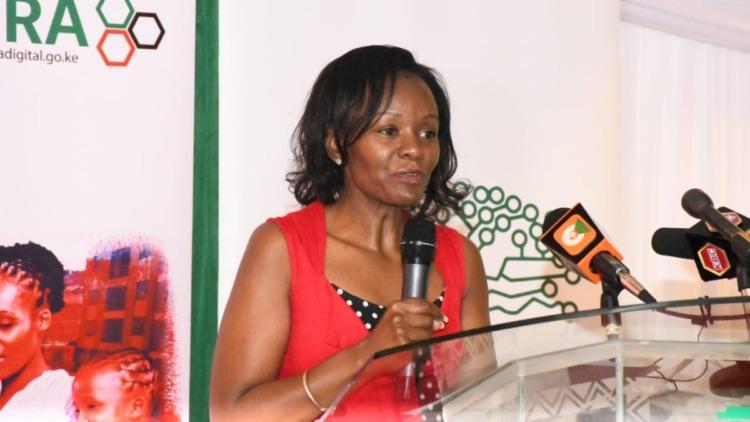- The survey found that the average hourly pay was Sh2,001
- 79 per cent of adult Kenyans nationally said they highly approve of the Ajira Digital Programme
- 1,209,506 people in Kenya are digital workers
A new survey has found that Kenyans working online earn an average of Sh20,774.00 every month.
This is according to the National Study on Digital and Digitally Enabled Work in Kenya, which was launched by the Kenya Private Sector Alliance (KEPSA. The study was commissioned by the Ajira Digital Programme and conducted by Tifa Research.
The survey found that the average hourly pay was Sh2,001, while the pay per week stood at Sh7,549 compared to
earnings per project which was Sh7,110.
Kenya’s minister for ICT, Innovation and Youth Joe Mucheru said attributed the rise in digital work to the uptake of Ajira Digital Programme, an initiative of the Kenyan government.
Read: Nairobi tops in mobile money study
“A key component in doing this work was the provision of the necessary tools such as training, and mentorship needed for the youth to work and earn an income with dignity. This study is a clear testament of the hard work that has gone into nurturing, growing, and positioning the Ajira Digital programme as a change-maker in how our young people access work and job opportunities,” he said.
Ajira Digital Programme, he added had partnered with the Judiciary through the Ministry of ICT, Innovation, and youth to create work opportunities for youth where 61 courts have been digitized through data entry, scanning and transcription of documents in 183 court stations and 7 tribunals.
“69,407 legal transcripts have been submitted to the judiciary in addition to over 10,596.46 transcribed audio hours and 169,844 case files input in the Case Tracking System. A total of 19,212,514 pages in 148,182 active case files have been scanned. Phase two of data entry and scanning is set to continue targeting to support 194 courts in 34 counties and the creation of additional 1,400 jobs over a 6-month period”, explained Mucheru.
The programme has also engaged over 50 official partners in addition to 35 linkage partners and who have enabled the project to link 37,851 youths to digital and digitally-enabled jobs on more than 56 digital work platforms.
Carole Kariuki, KEPSA Chief Executive Officer said that (63%) of adult Kenyans nationally were aware of the digital gig economy and that awareness of the Ajira Digital Programme had increased from 5.5 million people (14%) in 2019 to 7.3 million people (29%) in 2021.
“79 per cent of adult Kenyans nationally said they highly approve of the Ajira Digital Program, which shows that we are well on the way towards achieving the country’s objective of creating a globally competitive knowledge-based middle-income economy”, she said.
Among other findings, the report notes that currently 1,209,506 people (5) per cent of the adult population in Kenya are digital workers, rising from 638,400 or (3%) in 2019. Female workers accounted for 402,284 while workers between the ages of 18 to 35 made up 1,007,277 of the individuals doing digital and digitally-enabled jobs.
In terms of basic or intermediate skills, the study estimates that there are 461,523 digital marketers, 141,021 transcribers and about 250,000 article writers working online in Kenya. In terms of advanced skills, the country has 76,921 software developers and 64,100 data scientists working online.
Other opportunity areas captured in the study under various skills categories include academic and scientific writing, transcription, virtual assistants, online research and surveys, coding, and data science activities.
The study notes that (31%) of workers who have adopted digital and digitally-enabled work prefer it because of a lack of formal employment opportunities.
Read: President Kenyatta praises Ajira Digital for creating jobs, empowering youths
The study further reveals that 21% prefer to work online due to the flexibility and convenience of digital work and another (18%) said it was because of the ability to work part-time.
This is against the top 3 barriers to participating in digital and digitally-enabled work, which were captures as expensive internet costs at (53%), lack of skills to participate in some digital platforms at (52%) and lack of access to WiFi or internet connectivity at (21%).
Access to the internet, prohibitive cost of internet, family barriers as primary caregivers, cultural barriers, cyberbullying, lower internet usage skills and competition with experienced local and international gig workers stood out as barriers specific to women.
The KEPSA digital business process outsourcing (BPO) pulse check with over 300 private sector players, across 29 counties across Kenya indicates moderate use of digital work platforms at 41.2%, led by Small and Medium Enterprises that outsource services through them.
Currently, the sector is characterized by low popularity and frequency of outsourcing.
The trends show that older SMEs prefer the business process outsourcing model while younger SMEs are critically involved in digital outsourcing through platforms.
